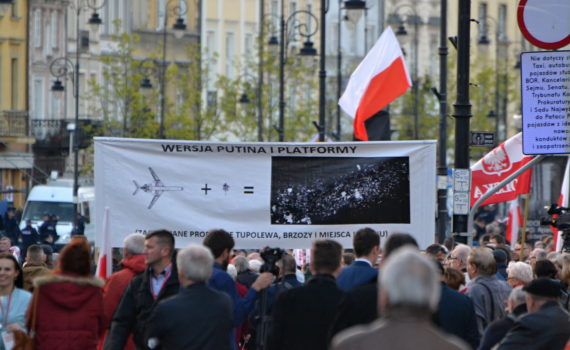
Smolensk (again!)
I’m so tired of writing about this. When a government spends so much time repeating a lie, the rest of us are forced to spend equal time rebutting them. And since the available attention span for news from Poland is so limited in the English speaking world, vital stores get buried because we have to wrestle with the same old canards. Now, on the seventh anniversary of this event, we are at it again.
On April 10, 2010, a tragic airplane crash led to the deaths of 96 Polish dignitaries in Smolensk, Russia. There should be nothing political about that statement – it is a simple fact. This is not one of those issues on which intelligent and honest people can disagree, on which different experts have arrived at different opinions. The belief that the crash was an assassination attempt has been spread by the propaganda apparatus of the current Polish regime, but that should be irrelevant to anyone interested in what actually happened. This story belongs in the ignominious hall of shame alongside claims that Hitler’s 1939 invasion of Poland was provoked by an attack by Polish troops on a radio station in Gliwice; that US ships were attacked by the North Vietnamese in the Gulf of Tonkin in 1964; that Sandam Hussein was compiling weapons of mass destruction and cooperating with Al Qaida in 2001. There is no legitimate debate or doubt here, but because politicians from the governing PiS party in Poland repeat the lies, the international press feels the need to print headlines saying “Poland Says Explosion Behind 2010 Plane Crash in Western Russia” (Bloomberg), “Polish Commission Says President’s Jet Likely Exploded Before 2010 Crash In Russia” (Radio Free Europe) “Polish crash is linked to ‘explosion’” (The Times), “Polands 2010 Smolensk Crash Caused by Explosion” (Daily Beast), “Polish leader’s jet probably exploded just before 2010 crash” (Reuters). All this based on the newest recapitulation of the lie, which came at a major press conference yesterday, on the 7th anniversary of the crash.
There is a mountain of evidence that the crash was the result of a combination of mistakes by both the pilots and the air traffic controllers, made under unfavorable weather conditions. There is absolutely no legitimate evidence to the contrary, despite what you might find if you wallow in the conspiracy swamps of the internet. Yesterday the government released their most recent “theory” of how it happened: having failed to find any evidence for their wild ideals, they came up with the desperate claim that a thermobaric bomb was the cause of the crash. These are devises which consist almost entirely of explosive material, as opposed (for example) to the mix of 25% fuel and 75% oxidizer in gunpowder. As a result, thermobaric bombs leave few if any traces. It’s perfect: now the lack of any evidence of an explosive device can be presented as proof that there was in fact such a bomb on board.
Experts in aviation disasters have ruled conclusively that the crash was an accident; those who would like to read the complete report of the crash investigation commission can download it here. I prefer to focus on an even simpler argument: there was no conceivable reason for the enemies of Lech Kaczyński to carry out such a risky operation. Let’s assume that Donald Tusk, Vladimir Putin, and perhaps even Angela Merkel wanted Lech Kaczyński to be removed from the presidency of Poland. That desire would have been reasonable: Kaczyński had been seriously undermining (then Prime Minister) Tusk’s foreign policy, the President’s support for Ukraine and Georgia was irritating Putin, and his nationalistic euroskepticism was a problem for Merkel. But let’s return to the early months of 2010: at that time Kaczyński’s favorability rating was at a record low: 23% deemed his performance as president to be “rather good” and a miniscule 3% “very good.” Presidential elections were scheduled for later in 2010, and there seemed little hope that Kaczyński would be re-elected. Meanwhile, PiS’s overall support remained stuck far below PO’s: throughout the period from 2007-2010, the two parties were consistently separated by more than 10%. In other words, in April of 2010 all the indications were that Kaczyński was on his way out, and that the movement he represented was collapsing alongside him. It is likely that the collapse of the Kaczyński brothers after an electoral defeat would have been decisive. The Smolensk crash turned that around by creating a martyr for the movement, and a foundational legend on which to base the party’s reconstruction. I do not doubt for a moment that Jarosław Kaczyński was devastated personally by his twin brother’s death, but as a political matter, he and his fellow members of PiS may well be the only ones who benefited from the catastrophe.